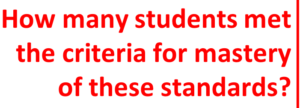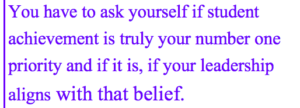498 words
Reading Time: 3 minutes
Are you asking the most important questions?
Effective school leaders who find themselves leading lower-achieving schools must have a clear focus on the one most important thing in school—student learning. However, with most schools already in session for nearly a month, many leaders still aren’t monitoring student learning as closely as they should.
one most important thing in school—student learning. However, with most schools already in session for nearly a month, many leaders still aren’t monitoring student learning as closely as they should.
Here is a typical conversation I have with school leaders during this time of year. See how you would answer the questions at the end.
I notice that the first unit of study listed in your 3rd grade Mathematics curriculum map consisted of 10 days and focused on exploring equal groups as a foundation for multiplication and division and included the following standards: 3.OA.1.1, 3.OA.1.2, 3.OA.1.3 and 3.OA.3.7. I also notice that the unit has already been completed.
-
-
- How many students met the criteria for mastery of these standards?
- How does that number compare to your overall goal for proficiency in Mathematics for this school year?
-
Do you have the answers?
If so, you should be on your way to developing the habits that get your school off to a great start. You are communicating to your team that you are a results-driven leader and influencing them to always be examining if their instructional decisions are impacting learning.
If not, you have to ask yourself if student achievement is truly your number one priority and if it is, if your leadership aligns with that belief. In my experience, leaders who closely monitor the outcome—(student learning)—not just the process (e.g., checking lesson plans and walking through classrooms and providing feedback on instruction)—know the answer to these questions and so do their teachers.
if student achievement is truly your number one priority and if it is, if your leadership aligns with that belief. In my experience, leaders who closely monitor the outcome—(student learning)—not just the process (e.g., checking lesson plans and walking through classrooms and providing feedback on instruction)—know the answer to these questions and so do their teachers.
The early weeks of the school year are critical to establishing the habits for long term success and effective schools already have feedback—in the form of data—to determine the effectiveness of their instructional decisions on the standards that have already been taught. With the feedback gained from this type of system, leaders and teachers receive timely feedback necessary to quickly determine not only if their achievement levels align with their overall goals but, more importantly, if their interventions are working and if any changes need to be made in their teaching.
What do you need?
To be able to accurately answer these questions, five things must be in place.
-
- Common student achievement goals
- Common unit assessments aligned with the standards and levels of cognitive complexity
- Common scoring to ensure consistency
- Collective and transparent reporting of achievement data
- Ongoing opportunities for students to demonstrate growth or mastery
Too many low achieving schools wait for the results of benchmark assessments that are administered way too infrequently and don’t provide timely feedback that allows for rapid decision making.  You simply can’t wait for an entire quarter for this information! While these types of measures are important and should be part of a school’s assessment palette, the results generated from such assessments should validate what you already know from the data you have been gathering all along.
You simply can’t wait for an entire quarter for this information! While these types of measures are important and should be part of a school’s assessment palette, the results generated from such assessments should validate what you already know from the data you have been gathering all along.
What are you waiting for?
For additional information, please visit Mark’s webpage.
Click here if you would like to sign up to receive future articles via email. Thank you.
 Mark Rolewski has assisted schools and school districts in designing and implementing successful turnaround initiatives for over 20 years. Mark has assisted with school turnaround in many districts and schools including those in Florida, New York City, Hartford, New Orleans, Memphis, Kansas City and Los Angeles. He is widely sought after by schools and school districts to speak about and assist with turnaround initiatives.
Mark Rolewski has assisted schools and school districts in designing and implementing successful turnaround initiatives for over 20 years. Mark has assisted with school turnaround in many districts and schools including those in Florida, New York City, Hartford, New Orleans, Memphis, Kansas City and Los Angeles. He is widely sought after by schools and school districts to speak about and assist with turnaround initiatives.
Thanks for the article, Mark! This year, we have two Tier 2 Intervention blocks built into our school day. Teachers have identified essential standards, focus calendars, etc. While our practice isn’t perfect, we’re doing more of the “right” work. Thanks for your continued leadership. It’s much appreciated.